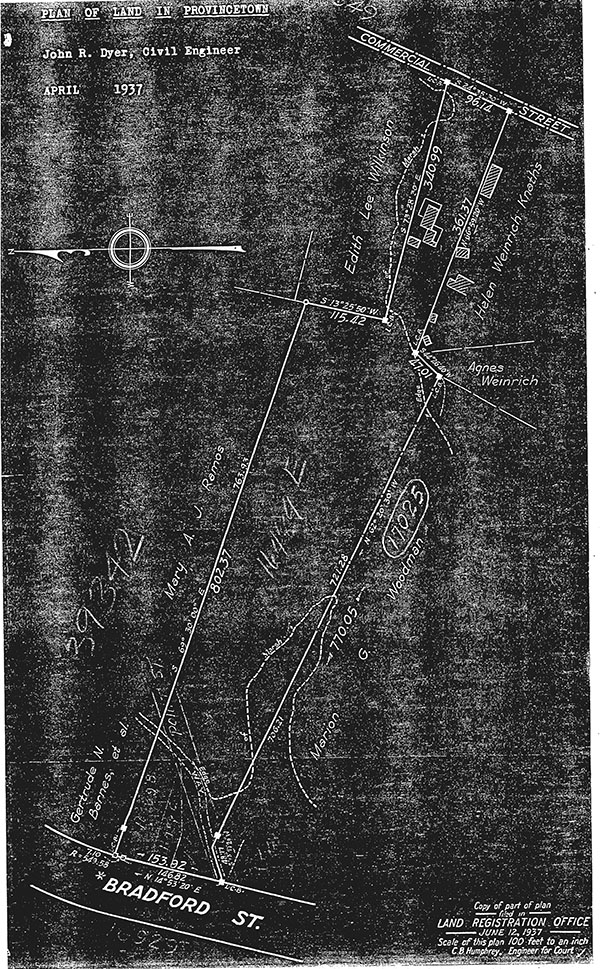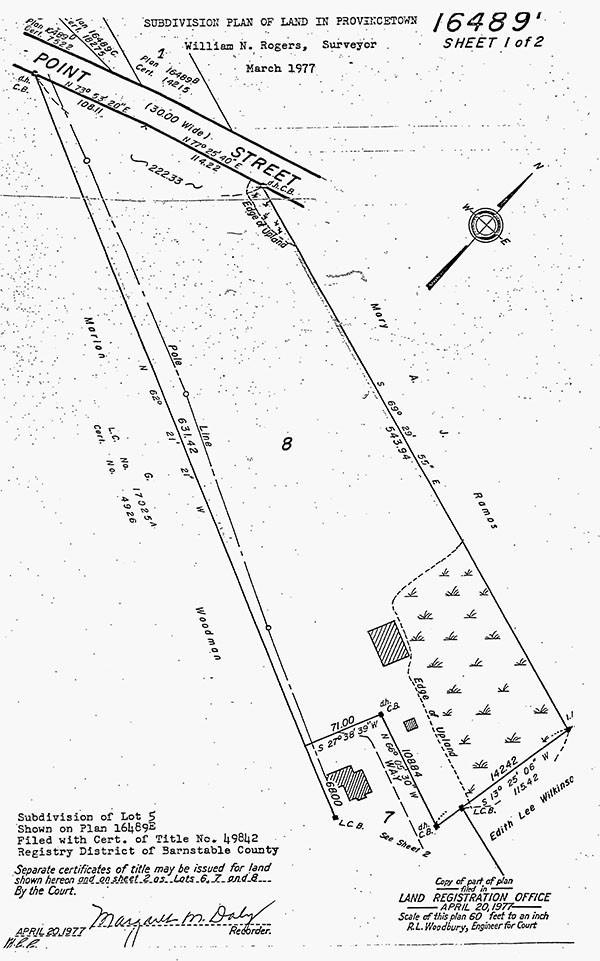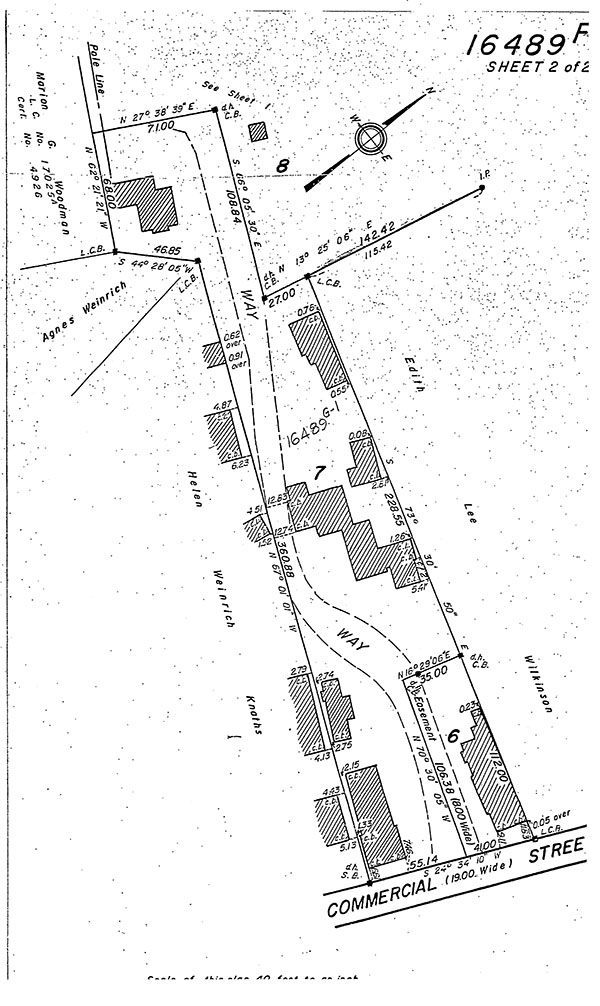The above numbered cases were commenced in the Superior Court Department and were transferred to the Land Court Department on motion of the parties allowed by the Court (Keating, J.) pursuant to the provisions of Massachusetts General Laws c. 212 §26A. In Case No. 105928 the named plaintiffs who comprised the Board of Selectmen of the Town of Provincetown ("the Board") at the commencement of the action, complain about the improvement of Point Street in the Town of Provincetown by the defendants after the denial by the Board of the defendants' request for a permit pursuant to the provisions of Article IV, §11 of the revised general by-laws of the Town.
In its complaint the Town sought a permanent injunction against trespass on, and the further construction of, Point Street, a declaration that said §11 requires written approval from the Board prior to any construction on a public way, and damages for the cost of repairs as well as punitive damages for trespasses on a public way. The defendants answered and counterclaimed seeking damages equal to the cost of restoring Point Street to the condition it was in prior to the Town's removal of the improvements made by Boyle and Ambrose.
Case No. 105929 is a complaint by Peter L. Boyle II, Trustee of Boyle Realty Trust ("Boyle") owner of registered land abutting said Point Street, and Frederic C. Ambrose and Nancy Ambrose (herein "Boyle-Ambrose" unless the context otherwise requires) proposed purchasers of said land for a declaratory judgment pursuant to the provisions of G.L. c. 231A that said §11 is invalid. While the cases still were pending in the Superior Court Department, an injunction was granted. [Note 1]
On September 2, 1982 motions for summary judgment in each case filed in the Land Court Department on behalf of Boyle, were argued by the parties, memoranda in support of their respective positions were filed, and on September 9, 1982 the Court ruled on preliminary motions to strike portions of the affidavits filed by the respective parties. The Court also allowed a motion by Boyle to amend the complaint in Case No. 105929 and gave the Town leave to file a further answer. Thereafter, the Town filed an amended answer. The Court afforded the parties an opportunity to argue further on basis of the amendment, but no party deemed further argument necessary. Therefore, on the pleadings, the affidavits as amended by order of Court, and the evidence submitted therewith, I find and rule that there is no material fact in dispute and that a motion for summary judgment accordingly is appropriate. I further find and rule that section 11 is valid and while seemingly applicable on its face to the present situation, was not intended to apply thereto. I therefore have hereafter set forth in this decision the courses now open to the parties in regard to the continuing dispute about Point Street.
The facts from which this controversy arises are as follows:
1. By a decision dated January 18, 1979, I found and ruled in Miscellaneous Case No. 87433 that the easement for a town way in that portion of Point Street taken by the Town of Provincetown ("the Town") pursuant to authority granted at the March 14, 1966 town meeting had not been discontinued. That decision was not appealed. Point Street accordingly is a town way.
2. Peter L. Boyle II, Trustee of Boyle Realty Trust, under a declaration of trust dated June 24, 1977 filed with the Barnstable Registry District of the Land Court as Document No. 22224, is the owner of a parcel of registered land on Point Street in Provincetown in the County of Barnstable, shown as Lot 8 on a copy of Land Court subdivision plan 16489F, sheets 1 and 2 of which are attached hereto for clarity. A portion of Point Street adjacent to the Boyle land is shown thereon. [Note 2]
3. Frederic C. Ambrose and Nancy Ambrose are prospective purchasers of said Lot 8. Warren Silva is a contractor who was employed by Boyle-Ambrose to construct Point Street. On December 16, 1980 Boyle filed an application and a condominium site plan with the town clerk for the Town of Provincetown in connection with plan review under section 3150 of the town zoning by-law which reads as follows:
3150. Plan Review. For development of more than four dwelling units or twelve guest units, a site plan for the development of the entire parcel of land shall be presented to the Planning Board which shall act on said plan within thirty days, approving it if and only if it is in accordance with the Zoning Bylaw of the Town and the Planning Board's Subdivision Regulations regarding installation of ways and services, as found under Section IV, Design Standards, and Section V, Required Improvements. No curb cut shall exceed twenty (20) feet in width. The plan shall be prepared by a registered architect, a registered land surveyor, or a registered professional engineer. No permits for multi-family dwellings* or commercial accomodations* may be issued by the Inspector of Buildings until all site plans, as required above, are approved by the Planning Board.
4. On February 25, 1981, Boyle, as a condition of the approval of the site plan, executed a covenant with the Provincetown Planning Board to construct an improved way over a portion of the layout of Point Street in accordance with the requirement by the Planning Board that the street be improved as part of a proposed condominium development on said lot 8 by Ambrose. On January 16, 1981 Boyle-Ambrose applied to the Board of Selectmen for a permit pursuant to the provisions of §11 of Article IV of the by-laws of the Town of Provincetown to construct Point Street according to specifications previously approved by the Planning Board. The provisions of said §11 read as follows :
"No person shall break or dig up the ground or surface any public way or sidewalk, or erect any staging for building, or deposit construction equipment or building materials thereon, or cause anything to be erected or built over a public way or sidewalk without first obtaining a written permit from the Board of Selectmen or their agent."
5. The Board of Selectmen denied the application for a §11 permit "to upgrade Point Street" for the following reasons:
"Members of the Board were concerned about lack of clarity with regard to possible impingement upon Provincetown wetlands and adequacy of proposed septic systems near wetlands, neither the Health Agent nor the Conservation Commission having made judgments with respect to same; some members felt that voters at Town Meeting should be consulted prior to the Board's approving the request."
6. On July 11, 1981 Boyle-Ambrose acting through Silva commenced improvements on Point Street without such permit; the work included the installation of clay for a distance of 45 feet at a cost of $2,200. Immediately thereafter, on July 13, 1981 the Board of Selectmen voted to remove the improvements, and this was done.
7. The Town's Complaint then was filed on July 13, 1981, and that of Boyle-Ambrose on July 14 in their respective cases.
8. On August 17, the Board of Selectmen, in executive session, again considered the question of the issuance of a permit to construct the way. At this meeting they denied the permit on the grounds that "any such improvement must be approved by vote of a town meeting of the Town of Provincetown and must be to the specifications and conditions of that Town meeting and then subsequently permitted by the Board of Selectmen under Article IV Section 11 of the By Laws of the Town."
9. Boyle-Ambrose filed a notice of intent with the Provincetown Conservation Commission on July 17, 1981 for the construction of Point Street. The Conservation Commission then issued an order of conditions for the construction of Point Street on August 6, 1981 for a distance of 130 feet from Bradford Street, rather than the 250 feet set forth in the covenant with the Planning Board. Thereafter, on August 11, 1981 the Planning Board approved an amendment to Boyle's covenant in which the distance from Bradford Street of the plaintiffs construction of Point Street was reduced to 130 feet.
10. At a town meeting held on March 16, 1982 an article submitted by the Board of Selectmen was adopted. The article reads as follows:
"To see if the town will vote to keep that section of Point Street from Gull Hill to Bradford Street extension in its present, unimproved state, untouched except to repair vandalism, as a remnant of the ancient way from the village to the outer shore, or to take any other action relative thereto."
Boyle-Ambrose is caught in the present proceeding in a classic Catch 22 situation. The Planning Board has authorized the condominium development but only on condition that improvements be made to Point Street, a town way on which Boyle's registered land abuts. The Board of Selectmen, reduced in number in all pertinent decisions because of conflicts of interest, refused Boyle-Ambrose's permission to construct the town way. The Town itself appears unwilling to make the necessary expenditures to construct Point Street. Indeed it is apparent on the record before me that many in the town are opposed to its construction either on ecological grounds, or because they do not favor the condominiums planned for Lot 8. Boyle-Ambrose thus is in the situation where permission to build the development has been granted by the Planning Board if Boyle-Ambrose improves Point Street, but Boyle-Ambrose cannot obtain approval from the Board of Selectmen to do so. This is an intolerable state of affairs which must be resolved.
Boyle-Ambrose attacks the by-law which required the consent of the Board of Selectmen to work on town ways as fatally defective in not stating standards for the exercise of discretion. The Court cannot accept this contention. The Provincetown by-law follows very closely the language of G. L. c. 81, §21 which treats of digging up state highways. It seems clear that in construing the language of section 11 or 21, as the case may be, the permit granting authority does not have an untrammeled right to refuse any requests thereunder, but must act reasonably with due consideration for the public health and safety. We do not reach the question of standards in the present cases, however, for it seems apparent that while the bylaw does apply on its face to the present case, since in constructing Point Street, Boyle-Ambrose necessarily will "break or dig up the ground or surface of a public way," it was not intended to apply to the unusual situation where a private party proposes to construct a public way. Rather it is directed at the situation where a public utility seeks to install its pipes or wires within a public way or an abutting owner to tie into services in the street or to cut the curb for a driveway. Here, however, Boyle-Ambrose want to go further and actually to construct a public way.
It seems obvious to the Court that no private person has authority to construct a public way without authorization from the Town. That authorization cannot come from the planning board, for it has no authority to require or even to permit the construction of a public way. See G. L. c. 41, §81G. It is the duty of the town to maintain its ways in a condition reasonably safe and convenient for travellers, and it must apropriate the money to do so. It can do the work through its own employees or it can contract with others to do the necessary construction. Tuckerman v. Moynihan, 282 Mass. 562 , 565-7, (1933) and cases cited. If it does not meet the statutory standard, it is subject to penalty in addition to the possible liability which it may incur to travellers if in fact the way is unsafe. G. L. c. 84, §22. The Planning Board requirements directed to BoyleAmbrose suggest that the Town seriously should consider its statutory responsibilities. If the town determines that Point Street must be repaired but is not financially able to construct it, then it would be prudent for the Town to contract with Boyle-Ambrose to do the work. The Board is free to work out the details within the Conservation Commission's requirements. If the Board is of the opinion that neither it nor Boyle-Ambrose should construct Point Street, then it can initiate the appropriate machinery for its discontinuance as a public way - including the necessity of its reference of thisquestion to the Planning Board as previously determined by this Court to be a necessary preliminary step. The attempt by the March 1982 town meeting to preserve Point Street as "a remnant of the ancient way from the village to the outer shore" cannot be accomplished under our present statutes. The Town should be cognizant of the fact that if Point Street is discontinued, the registered land of Boyle-Ambrose may lose its access and the owner accordingly be entitled to damages. The cases are collected in Malone v.
Commonwealth, Mass. (1979). [Note 3]
As already pointed out, the Planning Board has no jurisdiction to require Boyle-Ambrose to make improvements to a public way. This is the responsibility of the Town. Since the Planning Board has otherwise approved the site plan in accordance with the provisions of section 3150, Boyle-Ambrose is entitled to an order from this Court that the Board formally approve the plan without fulfillment of the covenant executed with it for the improvement of Point Street. The Planning Board, however, has not been made a party to Case No. 105929; if a motion to further amend the complaint is filed and service obtained upon said board, such an order will issue after the board has had an opportunity to answer and be heard.
In summary, therefore, on all the evidence, I find and rule as follows:
a) Article IV §11 does not apply to the initial construction of a public way;
b) A private person has no right to construct a public way without authorization from the board of selectmen;
c) The Planning Board has no power to authorize the construction of a public way, nor to condition its approval of site plans under Section 3150 on such construction;
d) The Town has a statutory duty to construct and keep in repair a public way and may be penalized if it does not as well as incurring liability for injuries thereon;
e) Point Street may not be preserved as an "ancient way" without its discontinuance in accordance with the relevant statutory provisions;
f) If Point Street is discontinued, then the Town may be liable to abutters for loss of access;
g) No damages are awarded in either case.
Judgment accordingly.
 MARY JO AVELLAR, GEORGE D. BRYANT, LEONARD FERGUSON, WAYNE PERRY and MICHAEL COELHO, as they are members of the Board of Selectmen of the TOWN OF PROVINCETOWN vs. PETER L. BOYLE II, Trustee of the BOYLE REALTY TRUST, FREDERIC AMBROSE and WARREN SILVA.
MARY JO AVELLAR, GEORGE D. BRYANT, LEONARD FERGUSON, WAYNE PERRY and MICHAEL COELHO, as they are members of the Board of Selectmen of the TOWN OF PROVINCETOWN vs. PETER L. BOYLE II, Trustee of the BOYLE REALTY TRUST, FREDERIC AMBROSE and WARREN SILVA.


